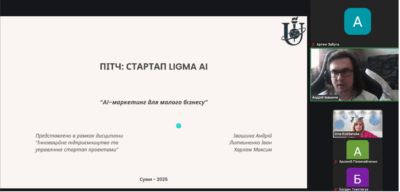The Ukrainian-language course “Innovative Entrepreneurship and Startup Project Management” has come to an end, with a final event featuring a startup idea pitching session by students. The presentations were delivered by students from group DIPS2-201, who received valuable advice and expert feedback on how to improve and further develop their business ideas from Oleksandr Kubatko and Bohdan Kovalov, trainers at the SumDU Business School.
The course was taught by Inna Koblianska, Associate Professor of the Department of Economics, Entrepreneurship, and Business Administration, and the project leader of the Jean Monnet Chair “Strengthening EU Leadership and Capacity in Science and Innovation” (101175767—EU_STRENGHTS—ERASMUS-JMO-2024-HEI-TCH-RSCH), under which this course was implemented.
The course program integrated both Ukrainian teaching experience in innovative entrepreneurship (in particular, materials developed by the YEP agency) and European approaches to startup development. Special attention was paid to the functioning of the European innovation ecosystem, market trends, scaling strategies, and EU tools for startup support. The practical part of the course was based on case studies and problem-based learning approaches.
Students presented a wide range of innovative ideas, including:
- automation of water purification processes;
- electricity generation from chimney heat energy;
- the use of artificial intelligence for marketing activities;
- other digital solutions aimed at tackling environmental challenges.
Most of the projects focus on the use of digital technologies and environmental sustainability, aligning closely with the EU’s strategic priorities in innovation development.
We sincerely congratulate the students on completing the course and wish them continued success in bringing their creative business ideas to life!
Jean Monnet Chair «Strengthening EU Leadership and Capacity in Science and Innovation» (101175767—EU_STRENGHTS—ERASMUS-JMO-2024-HEI-TCH-RSCH) 2024-2027. Funded by the European Union. Views and opinions expressed are however those of the author(s) only and do not necessarily reflect those of the European Union or the European Education and Culture Executive Agency (EACEA). Neither the European Union nor EACEA can be held responsible for them.



